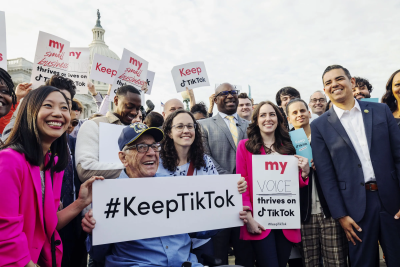In a critical legal development, the U.S. Department of Justice (DOJ) has opposed TikTok’s emergency motion to delay the enforcement of a law that requires ByteDance, its Chinese parent company, to divest the short-video app by January 19, 2025, or face a ban in the United States.
TikTok filed the emergency motion with the U.S. Court of Appeals for the District of Columbia, arguing that the law would effectively lead to the shutdown of one of the country’s most popular social media platforms, which serves over 170 million domestic monthly users.
DOJ’s Argument and National Security Concerns
The DOJ maintains that ByteDance’s control of TikTok poses ongoing national security threats due to concerns about data collection and potential misuse by the Chinese government. The department urged the appeals court to deny TikTok’s request to delay the law’s enforcement, emphasizing that the regulation aligns with broader efforts to address risks posed by foreign-owned applications.

While the DOJ conceded that the ban’s immediate implementation might not prevent existing users from accessing TikTok, it asserted that prohibitions on providing technical support and updates would eventually render the application unusable. This, it argued, underscores the need for swift action to protect U.S. security interests.
TikTok’s Counterarguments and Legal Maneuvers
In its filing, TikTok warned that without judicial intervention, the law’s enforcement would disrupt its operations and harm millions of users reliant on the platform for communication and content. The company also highlighted the need for a delay, arguing that the incoming Biden administration could reconsider the law’s implications and potentially grant a 90-day extension to the January 19 deadline.
This is not the first time TikTok has faced regulatory challenges in the U.S. Former President Donald Trump attempted to ban the app in 2020, citing similar national security concerns, but those efforts were blocked by the courts.
TikTok’s current legal battle has rekindled debates about the government’s authority to regulate foreign-owned digital platforms and its potential impact on free speech and consumer choice.
Impact on TikTok Users and the Tech Industry
If the divestment mandate proceeds, TikTok users in the U.S. could eventually lose access to the app as it becomes inoperable without ongoing technical support. The decision also sets a precedent for the U.S. government’s ability to restrict or ban other foreign-owned applications, raising questions about the balance between national security and global digital connectivity.

As the Supreme Court considers whether to intervene and with President Biden’s potential role in extending the deadline, the outcome of this case could have far-reaching implications for both the tech industry and international regulatory practices. ByteDance’s response and further legal strategies will be closely watched as the January 19 deadline approaches.
Background on the Law
The law mandating ByteDance’s divestment of TikTok was upheld by a three-judge panel from the U.S. Court of Appeals, granting the U.S. government broader powers to address national security concerns tied to foreign technology ownership. This decision reflects heightened scrutiny over the control of user data by companies with foreign ties, particularly those based in China.
In 2020, the Trump administration’s attempts to ban TikTok and Tencent-owned WeChat were met with significant legal and public resistance. However, the renewed focus on TikTok under the Biden administration signals bipartisan concerns about data sovereignty and the influence of Chinese-owned platforms in the U.S. digital ecosystem.
Conclusion
As the legal battle unfolds, TikTok’s future in the U.S. remains uncertain. The case highlights the intersection of national security, data privacy, and the growing complexities of regulating global technology companies. With the Jan. 19 deadline looming, all eyes are on the Supreme Court and President Biden’s administration to determine the next steps in this high-stakes dispute.









